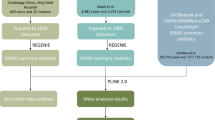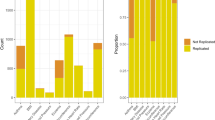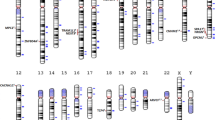Abstract
We conducted a genome-wide association study testing single nucleotide polymorphisms (SNPs) and copy number variants (CNVs) for association with early-onset myocardial infarction in 2,967 cases and 3,075 controls. We carried out replication in an independent sample with an effective sample size of up to 19,492. SNPs at nine loci reached genome-wide significance: three are newly identified (21q22 near MRPS6-SLC5A3-KCNE2, 6p24 in PHACTR1 and 2q33 in WDR12) and six replicated prior observations1,2,3,4 (9p21, 1p13 near CELSR2-PSRC1-SORT1, 10q11 near CXCL12, 1q41 in MIA3, 19p13 near LDLR and 1p32 near PCSK9). We tested 554 common copy number polymorphisms (>1% allele frequency) and none met the pre-specified threshold for replication (P < 10−3). We identified 8,065 rare CNVs but did not detect a greater CNV burden in cases compared to controls, in genes compared to the genome as a whole, or at any individual locus. SNPs at nine loci were reproducibly associated with myocardial infarction, but tests of common and rare CNVs failed to identify additional associations with myocardial infarction risk.
This is a preview of subscription content, access via your institution
Access options
Subscribe to this journal
Receive 12 print issues and online access
$209.00 per year
only $17.42 per issue
Buy this article
- Purchase on Springer Link
- Instant access to full article PDF
Prices may be subject to local taxes which are calculated during checkout

Similar content being viewed by others
Change history
27 May 2009
NOTE: In the version of this article initially published, the names of four co-authors (Christopher W Knouff, Dawn M Waterworth, Max C Walker, Vincent Mooser) were omitted from the author list. The error has been corrected in the HTML and PDF versions of the article.
References
McPherson, R. et al. A common allele on chromosome 9 associated with coronary heart disease. Science 316, 1488–1491 (2007).
Helgadottir, A. et al. A common variant on chromosome 9p21 affects the risk of myocardial infarction. Science 316, 1491–1493 (2007).
Samani, N.J. et al. Genomewide association analysis of coronary artery disease. N. Engl. J. Med. 357, 443–453 (2007).
Willer, C.J. et al. Newly identified loci that influence lipid concentrations and risk of coronary artery disease. Nat. Genet. 40, 161–169 (2008).
Rosamond, W. et al. Heart disease and stroke statistics—2008 update: a report from the American Heart Association Statistics Committee and Stroke Statistics Subcommittee. Circulation 117, e25–e146 (2008).
Lloyd-Jones, D.M. et al. Parental cardiovascular disease as a risk factor for cardiovascular disease in middle-aged adults: a prospective study of parents and offspring. J. Am. Med. Assoc. 291, 2204–2211 (2004).
Centers for Disease Control and Prevention. Prevalence of heart disease—United States, 2005. MMWR Morb. Mortal. Wkly. Rep. 56, 113–118 (2007).
Nora, J.J., Lortscher, R.H., Spangler, R.D., Nora, A.H. & Kimberling, W.J. Genetic-epidemiologic study of early-onset ischemic heart disease. Circulation 61, 503–508 (1980).
Sebat, J. et al. Large-scale copy number polymorphism in the human genome. Science 305, 525–528 (2004).
McCarroll, S.A. et al. Integrated detection and population-genetic analysis of SNPs and copy number variation. Nat. Genet. 40, 1166–1174 (2008).
Korn, J.M. et al. Integrated genotype calling and association analysis of SNPs, common copy number polymorphisms and rare CNVs. Nat. Genet. 40, 1253–1260 (2008).
Pe'er, I., Yelensky, R., Altshuler, D. & Daly, M.J. Estimation of the multiple testing burden for genomewide association studies of nearly all common variants. Genet. Epidemiol. 32, 381–385 (2008).
Cavdar Koc, E., Burkhart, W., Blackburn, K., Moseley, A. & Spremulli, L.L. The small subunit of the mammalian mitochondrial ribosome. Identification of the full complement of ribosomal proteins present. J. Biol. Chem. 276, 19363–19374 (2001).
Kwon, H.M. et al. Cloning of the cDNa for a Na+/myo-inositol cotransporter, a hypertonicity stress protein. J. Biol. Chem. 267, 6297–6301 (1992).
Abbott, G.W. et al. MiRP1 forms IKr potassium channels with HERG and is associated with cardiac arrhythmia. Cell 97, 175–187 (1999).
Allen, P.B., Greenfield, A.T., Svenningsson, P., Haspeslagh, D.C. & Greengard, P. Phactrs 1–4: a family of protein phosphatase 1 and actin regulatory proteins. Proc. Natl. Acad. Sci. USA 101, 7187–7192 (2004).
Holzel, M. et al. Mammalian WDR12 is a novel member of the Pes1-Bop1 complex and is required for ribosome biogenesis and cell proliferation. J. Cell Biol. 170, 367–378 (2005).
Hobbs, H.H., Brown, M.S. & Goldstein, J.L. Molecular genetics of the LDL receptor gene in familial hypercholesterolemia. Hum. Mutat. 1, 445–466 (1992).
Linsel-Nitschke, P. et al. Lifelong reduction of LDL-cholesterol related to a common variant in the LDL-receptor gene decreases the risk of coronary artery disease—a Mendelian Randomisation study. PLoS ONE 3, e2986 (2008).
Abifadel, M. et al. Mutations in PCSK9 cause autosomal dominant hypercholesterolemia. Nat. Genet. 34, 154–156 (2003).
Cohen, J.C., Boerwinkle, E., Mosley, T.H. Jr & Hobbs, H.H. Sequence variations in PCSK9, low LDL, and protection against coronary heart disease. N. Engl. J. Med. 354, 1264–1272 (2006).
Kathiresan, S. et al. A PCSK9 missense variant associated with a reduced risk of early-onset myocardial infarction. N. Engl. J. Med. 358, 2299–2300 (2008).
Kathiresan, S. et al. Six new loci associated with blood low-density lipoprotein cholesterol, high-density lipoprotein cholesterol or triglycerides in humans. Nat. Genet. 40, 189–197 (2008).
Kathiresan, S. et al. Common variants at 30 loci contribute to polygenic dyslipidemia. Nat. Genet. 41, 56–65 (2009).
Ridker, P.M., Rifai, N., Cook, N.R., Bradwin, G. & Buring, J.E. Non-HDL cholesterol, apolipoproteins A-I and B100, standard lipid measures, lipid ratios, and CRP as risk factors for cardiovascular disease in women. J. Am. Med. Assoc. 294, 326–333 (2005).
Erdmann, J. et al. Novel susceptibility locus for coronary artery disease on chromosome 3q22.3. Nat. Genet. advance online publication, doi:10.1038/ng.307 (8 February 2009).
Kathiresan, S. et al. Polymorphisms associated with cholesterol and risk of cardiovascular events. N. Engl. J. Med. 358, 1240–1249 (2008).
International Schizophrenia. Consortium. Rare chromosomal deletions and duplications increase risk of schizophrenia. Nature 455, 237–241 (2008).
Zeggini, E. et al. Meta-analysis of genome-wide association data and large-scale replication identifies additional susceptibility loci for type 2 diabetes. Nat. Genet. 40, 638–645 (2008).
Purcell, S. et al. PLINK: a tool set for whole-genome association and population-based linkage analysis. Am. J. Hum. Genet. 81, 559–575 (2007).
Acknowledgements
HARPS. The HARPS study was supported by the grants (R01HL056931, P30ES007033) and a contract (N01HD013107) from US National Institutes of Health.
REGICOR. The REGICOR study was partially funded by the Ministerio de Sanidad y Consumo, Instituto de Salud Carlos III (Red HERACLES RD06/0009), the CIBER Epidemiología y Salud Pública, the FIS and AGAUR Generalitat de Catalunya.
Massachusetts General Hospital. The MIGen study was funded by the US National Institutes of Health (NIH) and National Heart, Lung, and Blood Institute's STAMPEED genomics research program through a grant to D.A. S.K. is supported by a Doris Duke Charitable Foundation Clinical Scientist Development Award, a charitable gift from the Fannie E. Rippel Foundation, the Donovan Family Foundation, a career development award from the NIH and the Department of Medicine and Cardiovascular Research Center at Massachusetts General Hospital. J.B.M. is supported by grant K24 DK080140 from the NIH.
Broad Institute. Genotyping was partially funded by The Broad Institute Center for Genotyping and Analysis, which is supported by grant U54 RR020278 from the National Center for Research Resources.
FINRISK. V.S. was supported by the Sigrid Juselius Foundation. L.P. was supported by the Center of Excellence in Complex Disease Genetics of the Academy of Finland, the Nordic Center of Excellence in Disease Genetics and the Finnish Foundation for Cardiovascular Research.
WTCCC Study. The study was funded by the Wellcome Trust. Recruitment of cases for the WTCCC Study was carried out by the British Heart Foundation (BHF) Family Heart Study Research Group and supported by the BHF and the UK Medical Research Council. N.J.S. and S.G.B. hold chairs funded by the BHF.
PennCATH/MedStar. Recruitment of the PennCATH cohort was supported by the Cardiovascular Institute of the University of Pennsylvania. Recruitment of the MedStar cohort was supported by a research grant from GlaxoSmithKline and from the MedStar Research Institute. Genotyping was done at the Center for Applied Genomics at the Children's Hospital of Philadelphia and supported by GlaxoSmithKline through an Alternate Drug Discovery Initiative research alliance award (to M.P.R. and D.J.R.) with the University of Pennsylvania School of Medicine. D.J.R. was supported by a Doris Duke Charitable Foundation Distinguished Clinical Scientist Award.
Verona Heart Study. The study was supported by a grant from the Italian Ministry of University and Research and grants from the Veneto Region and the Cariverona Foundation, Verona, Italy.
Mid-America Heart Institute. T.M. is supported by a career development grant from the NIH.
Irish Family Study. We thank the clinical staff members for their valuable contribution to the collection of families for this study. The research was supported by the Northern Ireland Research and Development Office, a Royal Victoria Hospital Research Fellowship, the Northern Ireland Chest, Heart and Stroke Association, and the Heart Trust Fund (Royal Victoria Hospital).
GerMIFS I and II. The German Study was supported by the Deutsche Forschungsgemeinschaft and the German Federal Ministry of Education and Research in the context of the German National Genome Research Network.
Cardiogenics. Cardiogenics is an EU-funded integrated project (LSHM-CT-2006-037593).
INTERHEART. S.A. holds the Michael G. DeGroote and Heart and Stroke Foundation of Ontario Chair in Population Health and the May Cohen Eli Lilly Endowed Chair in Women's Health Research, McMaster University. We acknowledge the contribution of S. Yusuf who initiated and, together with the Steering Committee, supervised the conduct of the INTERHEART study. We thank members of the Project Office, S. Rangarajan (study coordinator) and K. Hall (laboratory manager), for their assistance in coordinating the genetics component of the INTERHEART project. R.D. is a recipient of a Canada Graduate Scholarship Doctoral Award from the Canadian Institutes for Health Research.
Disclosures. The collection of clinical and sociodemographic data in the Dortmund Health Study was supported by the German Migraine & Headache Society (DMKG) and by unrestricted grants of equal share from Astra Zeneca, Berlin Chemie, Boots Healthcare, Glaxo-Smith-Kline, McNeil Pharma (former Woelm Pharma), MSD Sharp & Dohme and Pfizer to the University of Muenster.
Author information
Authors and Affiliations
Consortia
Corresponding author
Additional information
A full list of members is provided in the Supplementary Note.
A full list of members is provided in the Supplementary Note.
Supplementary information
Supplementary Text and Figures
Supplementary Methods, Supplementary Note, Supplementary Figures 1 and 2, Supplementary Tables 1–3 (PDF 845 kb)
Rights and permissions
About this article
Cite this article
Myocardial Infarction Genetics Consortium. Genome-wide association of early-onset myocardial infarction with single nucleotide polymorphisms and copy number variants. Nat Genet 41, 334–341 (2009). https://doi.org/10.1038/ng.327
Received:
Accepted:
Published:
Issue Date:
DOI: https://doi.org/10.1038/ng.327
This article is cited by
-
Genome-wide analyses of early-onset acute myocardial infarction identify 29 novel loci by whole genome sequencing
Human Genetics (2023)
-
A Study of Associations Between rs9349379 (PHACTR1), rs2891168 (CDKN2B-AS), rs11838776 (COL4A2) and rs4880 (SOD2) Polymorphic Variants and Coronary Artery Disease in Iranian Population
Biochemical Genetics (2022)
-
Reply to: Hultström et al., Genetic determinants of mannose-binding lectin activity predispose to thromboembolic complications in critical COVID-19. Mannose-binding lectin genetics in COVID-19
Nature Immunology (2022)
-
Monogenic and Polygenic Models of Coronary Artery Disease
Current Cardiology Reports (2021)
-
Importance of Thyroid Hormone level and Genetic Variations in Deiodinases for Patients after Acute Myocardial Infarction: A Longitudinal Observational Study
Scientific Reports (2020)



